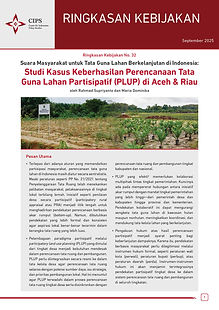Towards More Sustainable Agro-food Systems in Indonesia

Penulis

Maria Monica Wihardja

Bustanul Arifin
The agriculture sector in Indonesia has played a significant role in poverty reduction and economic transformation. However, challenges remain in improving agricultural productivity and farmers' incomes to eradicate extreme poverty and ensure food security. The agriculture sector accounts for around one-third of employment in Indonesia. To achieve Indonesia’s ambitious goals of eradicating extreme poverty, improving agricultural productivity, and achieving net-zero carbon emissions, Indonesia needs to transition to more sustainable agro-food systems.
The current strategies for improving agro-food systems in Indonesia are no longer sustainable or effective. The sector has been both a contributor to and a victim of climate change, with agriculture, land-use change, and forestry as major contributors to greenhouse gas emissions. Deforestation for palm oil plantations has been a significant driver of land-use change. Sustainable agro-food systems are essential for achieving Indonesia's climate commitments and mitigating the impacts of climate change on farmers and fishers.

Mukhammad Faisol Amir













































